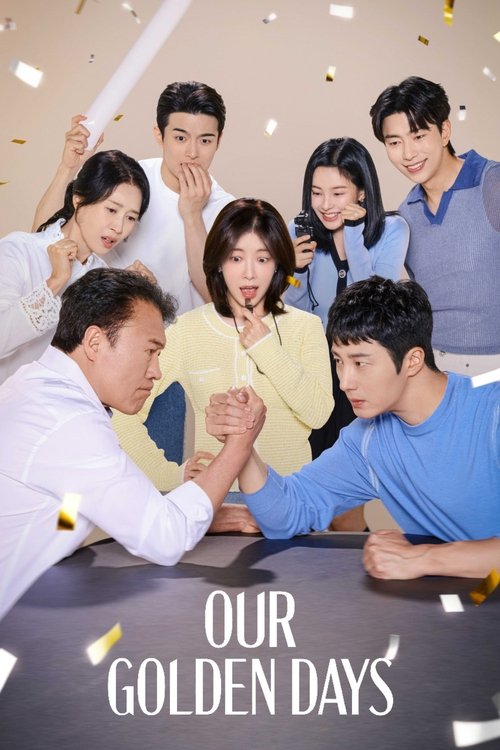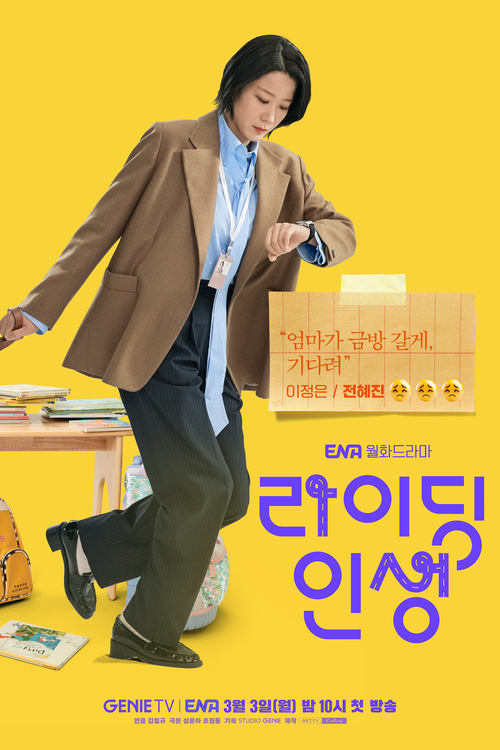
Ask Your Own Question
What is the plot?
Ma Gwang-sook, a dedicated post office clerk in her late 40s, lives a quiet, routine life, caring for her aging mother, Ju Sil, and remaining unmarried. Oh Jang-soo, the eldest of five brothers and CEO of Eagle Brewery, visits the post office daily to send handwritten letters to his four younger brothers--Cheon-soo, Heung-soo, Beom-soo, and Gang-soo--who live in different cities and countries. Gwang-sook is deeply moved by Jang-soo's devotion to his family, seeing it as a rare and admirable quality in the modern world. One evening, after sending her mother to a senior living community, Gwang-sook becomes overwhelmed with sadness and drinks heavily, nearly losing consciousness. Jang-soo happens to be nearby and comforts her, leading to a deepening emotional connection between them. Their relationship progresses quickly, and despite initial hesitation, Gwang-sook agrees to marry Jang-soo, with her mother helping her choose a wedding dress for the occasion.
After their marriage, Gwang-sook moves into the Eagle Brewery household, where she begins to form bonds with her new brothers-in-law. However, shortly after the wedding, Jang-soo dies unexpectedly, leaving Gwang-sook a widow. Devastated but determined, she decides to honor her late husband's memory by taking over the management of Eagle Brewery, despite having no prior experience in the business. The brothers, each dealing with their own grief, initially doubt her ability to lead but gradually come to respect her sincerity and dedication. Gwang-sook's decision to stay and fight for the family business becomes the central driving force of the story.
As Gwang-sook settles into her new role, the brothers' personal lives begin to unravel. The eldest brother-in-law, Cheon-soo, who is married with a wife and child living in the USA, reconnects with an old flame. By episode 8, his former lover finalizes her divorce, and the two begin an affair, creating tension within the family. Meanwhile, the second brother, Heung-soo, a single father and university professor, becomes romantically involved with the girlfriend of the youngest brother, Gang-soo, who is also his student. This relationship introduces ethical complications and family strife, as Heung-soo struggles with his feelings and the power dynamics at play. Despite these challenges, Heung-soo's genuine kindness and sincerity are portrayed, adding complexity to his character.
The third brother, Beom-soo, experiences a less tumultuous romantic arc, engaging in a standard romance that briefly becomes a love triangle, providing some relief from the heavier family drama. The youngest brother, Gang-soo, initially resents Gwang-sook's presence and authority but gradually comes to accept her as a maternal figure, especially after she supports him through personal setbacks. Throughout the series, the brothers face various professional challenges at the brewery, including financial difficulties, competition, and internal disagreements about the company's direction. Gwang-sook's leadership is tested repeatedly, but her resilience and commitment to the family's legacy earn her the brothers' trust and loyalty.
As the series progresses, secrets from the past are revealed, including unresolved conflicts between the brothers and hidden truths about their parents' deaths. These revelations lead to confrontations, emotional breakdowns, and, ultimately, reconciliation. The family must also deal with external threats to the brewery, including a corporate takeover attempt, which forces them to unite and defend their business. Gwang-sook's mother, Ju Sil, plays a supportive role, offering wisdom and comfort during the family's darkest moments. The brothers, each in their own way, begin to take more responsibility for the brewery and for each other, maturing as individuals and as a family unit.
In the final episodes, the family overcomes their greatest challenges together. Cheon-soo ends his affair and recommits to his family, seeking forgiveness from his wife and child. Heung-soo acknowledges the inappropriateness of his relationship and steps back, focusing on being a better father and mentor. Beom-soo finds stability in his relationship, and Gang-soo, now more mature, takes on a larger role in the business. Gwang-sook, having earned the respect and love of her brothers-in-law, solidifies her place as the heart of the family. The series concludes with the family celebrating their victories, both personal and professional, and looking forward to a future built on mutual support, understanding, and the enduring legacy of Eagle Brewery.
More TV Shows Like This
Browse All TV Shows →What is the ending?
The ending of For Eagle Brothers (2025) concludes with the birth of twins, a year-long time jump showing the characters' changed lives, and a series of reconciliations and new beginnings. The main characters settle into their roles within the family and community, with some relationships evolving quietly and others remaining unresolved.
Expanded narrative of the ending, scene by scene:
The final episodes open with the dramatic birth of twins to the older couple, who had married later in life. The twins arrive quickly after the onset of contractions, emphasizing the challenges faced by older parents. The scene captures the exhaustion and joy of the parents, highlighting the physical and emotional toll of caring for newborns at their age. Despite their financial ability to hire help, the couple struggles with night feedings and the demands of parenthood.
Parallel to this, the storyline focuses on Silla Dad, who undergoes a brain transplant that is portrayed as a transformative experience. After a year apart from his wife, this procedure seemingly humanizes him, leading to a somewhat abrupt and arguably unconvincing reconciliation between the families. The scene is slow and repetitive, revisiting themes from previous episodes but ultimately culminating in forgiveness and unity.
Meanwhile, the romantic subplot involving Seri and Beom Soo is given a time jump of one year. Their relationship progresses quietly: they walk together without holding hands, share a mild hug, and Beom Soo proposes. Their first kiss is brief and understated, lacking the passion expected from a romantic climax. The narrative also reveals that Bom and Gang Soo have been dating for a year, but this is only mentioned at the very end rather than shown, leaving their relationship development largely offscreen.
Ok Bun, who had invested heavily in supporting Heung Soo's career as a celebrity dancer, opens an expensive dance studio for him. However, Heung Soo desires to focus on family life, creating tension. Ok Bun's jealousy surfaces, and she takes over a toast shop, though it is unclear if she retains ownership of her salon. Their storyline is marked by conflict and resource strain, but it receives limited screen time in the finale.
Mi-Soon, another key character, sells her store to become the brewery's accountant and administrator. She emerges as the matriarch of the Eagle family, managing the business alongside Go and Joo-Sil. Despite her competence, she receives little narrative focus in the finale. The brewery scenes show the family working together, with Go encouraging Joo-Sil to stay and help run the business.
The finale also includes a patchwork wedding and a pregnancy reveal, but these events are presented with minimal dramatization, often told rather than shown. Young-Eun's custody battle is resolved with a joint custody agreement that neither parent fully accepts but must abide by.
The series closes with a montage-like sequence: Go and Joo-Sil are seen carefree, cruising as if they were young adults, while the family adjusts to their new dynamics. The final moments emphasize continuity and the passage of time rather than dramatic resolution.
Fates of main characters at the end:
- The older couple: Parents of newborn twins, adjusting to parenthood with some difficulty but united.
- Silla Dad: Transformed by a brain transplant, reconciled with his wife and family.
- Seri and Beom Soo: In a tentative romantic relationship, engaged but with limited emotional depth shown.
- Bom and Gang Soo: Dating for a year, relationship acknowledged but not deeply explored.
- Ok Bun and Heung Soo: Strained relationship due to differing life goals; Ok Bun invests in business ventures.
- Mi-Soon: Brewery accountant and family matriarch, managing business affairs with Go and Joo-Sil.
- Go and Joo-Sil: Partners running the brewery, shown enjoying a carefree moment at the end.
Overall, the ending focuses on family unity, the challenges of aging parents, and the slow evolution of relationships, though many developments are conveyed through exposition rather than dramatic scenes.
Is there a post-credit scene?
Yes, the TV show For Eagle Brothers (2025) includes a post-credit scene. It reprises a family exercise scene similar to one from the 2009 show Weekender SMILE YOU, serving as a gentle, extended farewell at the end of episode 54. This scene follows a one-year time skip and shows the main characters celebrating the 100-day milestone of their twins, highlighting the new family dynamics and the hopeful future after the series' events. It also subtly confirms that Bom and Gangsoo have been dating for a year, culminating in a simple, character-fitting proposal, and includes appearances by other characters like Gyeol, who was underutilized in the series.
What are the circumstances and impact of O Jang Su's death on Ma Gwang Suk and the family?
O Jang Su, the CEO of Eagle Brewery and Ma Gwang Suk's husband, dies in an accident just 10 days after their marriage. His sudden death forces Ma Gwang Suk to take over the brewery and become the primary breadwinner for her four brothers-in-law, dramatically changing her life and the family dynamics.
How does Ma Gwang Suk manage the challenges of running Eagle Brewery and supporting her brothers-in-law?
Ma Gwang Suk, despite being cheerful and lively, faces significant challenges managing the brewery's debts and operations after her husband's death. She takes on the responsibility of rebuilding the business while supporting her four brothers-in-law, balancing family obligations with professional pressures.
What is the nature of the relationship between Ma Gwang Suk and Han Dong Seok?
Ma Gwang Suk meets Han Dong Seok, the chairman of LX Hotel, who is wealthy but lonely after losing his wife 15 years ago. Their relationship is marked by conflict and emotional complexity, as Han Dong Seok is arrogant and stubborn, but their interactions bring surprises and development in the story.
Who are the five Eagle brothers and what are their individual roles or characteristics?
The five Eagle brothers are O Jang Su (eldest son, deceased), Oh Chun Su (second son), Oh Hyung Soo (third son), Oh Beom Soo (fourth son), and Oh Kang Soo (youngest son). Each brother has distinct personalities and roles within the family and the brewery, contributing to the family dynamics and plot progression.
What secrets or mysteries are revealed related to the brewery and the family throughout the series?
The series uncovers mysterious elements surrounding O Jang Su's death and hidden secrets within the family and brewery. These revelations affect the characters' relationships and the unfolding of the plot, adding layers of intrigue and drama to the story.
Is this family friendly?
For Eagle Brothers (2025) is a family drama that centers on the lives of five brothers and their sister-in-law, Ma Gwang-seok, who becomes the family's pillar after a sudden tragedy. The show is designed to be warm, comedic, and emotionally uplifting, focusing on themes of responsibility, resilience, and the bonds of chosen family. It is generally family-friendly, with a tone that emphasizes humor, romance, and the everyday challenges of maintaining a household and business.
However, there are some potentially sensitive or upsetting elements that parents or sensitive viewers should be aware of, even though the show handles them with care and without graphic detail:
- Sudden Death of a Family Member: Early in the series, a central character dies unexpectedly in an accident. This event is emotionally intense, with scenes showing the family's shock, grief, and the immediate aftermath. The portrayal focuses on the characters' internal struggles--Ma Gwang-seok's sense of duty and the brothers' confusion and loss--rather than on the accident itself. There are no graphic depictions of violence or death, but the emotional weight is palpable as the family gathers, mourns, and begins to adjust to their new reality.
- Adult Responsibilities and Stress: The series realistically depicts the pressures faced by Ma Gwang-seok as she steps into a leadership role at the brewery and becomes responsible for her brothers-in-law. Scenes show her juggling work stress, financial worries, and the emotional labor of holding the family together. These moments could be relatable but also stressful for younger viewers or those sensitive to family tension.
- Romantic Subplots and Mild Conflict: There are multiple romantic storylines involving the brothers and other characters. These subplots include light misunderstandings, jealousy, and the awkwardness of new relationships, but there is no explicit content, harsh language, or physical altercations. The conflicts are resolved through communication and empathy, reflecting the show's wholesome approach.
- Themes of Loss and Loneliness: Some characters, such as Han Dong-seok, grapple with long-term loneliness and the emotional scars of past loss. These themes are explored through quiet, introspective scenes that may resonate deeply with sensitive viewers, though they are not depicted in a traumatic or overwhelming manner.
- Workplace and Family Disputes: Occasional scenes show disagreements at the brewery or within the family, but these are resolved through dialogue and mutual support. There is no shouting, violence, or lasting hostility--just the normal friction of people living and working closely together.
In summary, For Eagle Brothers is suitable for most family audiences, offering a blend of comedy, romance, and heartfelt drama. The most potentially upsetting element is the early, off-screen death of a family member and the ensuing grief, but the series handles this with sensitivity and focuses on healing and togetherness. There are no scenes of violence, substance abuse, or inappropriate content, making it a generally safe choice for viewers seeking uplifting, character-driven storytelling.































